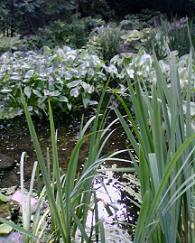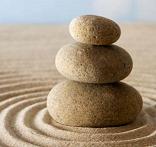 In previous posts, we looked at the importance of giving ourselves time outs, as well as other techniques to manage stress and anxiety. Another great way we can keep things like stress, anxiety and depression from building throughout the day is to start bringing mindfulness into our everyday life.
In previous posts, we looked at the importance of giving ourselves time outs, as well as other techniques to manage stress and anxiety. Another great way we can keep things like stress, anxiety and depression from building throughout the day is to start bringing mindfulness into our everyday life.We often talk about two broad categories of mindfulness practice. Formal mindfulness involves setting aside some time specifically for practicing mindfulness as we do when we engage in mindfulness meditation. Informal mindfulness, on the other hand, refers to finding ways to incorporate mindfulness into our daily lives.
Since mindfulness simply involves paying attention to the present moment, mindfulness can be brought to anything we do. We can take a shower mindfully, shave and brush out teeth mindfully, eat mindfully, walk mindfully, drive mindfully, work on a computer mindfully, talk to people mindfully. Whatever it is we’re doing, we can do it mindfully.
In mindfulness meditation, the focus of our attention is generally our breath. When we incorporate mindfulness into our every day lives, the focus of out attention becomes whatever it is we’re doing in the present moment.
Of course, this is a lot easier said than done. When doing mindfulness meditation, we create a quite, controlled environment, conducive to being able to focus only on our breathing. Yet our minds still get easily distracted and we continually have to consciously return our attention to what we are doing: just sitting and breathing.
 In the real world, it can be even more challenging to stay focused on what we are doing in the present, because we face many more distractions. Compared to a quite meditation space, there is so much more going on around us. Our senses are constantly bombarded. We’re often surrounded by other people we have to deal with. We have places to be and things to do and deadlines to meet.
In the real world, it can be even more challenging to stay focused on what we are doing in the present, because we face many more distractions. Compared to a quite meditation space, there is so much more going on around us. Our senses are constantly bombarded. We’re often surrounded by other people we have to deal with. We have places to be and things to do and deadlines to meet.
We also have so many disctractions to pull our minds away from what it is we’re actually doing. If we’re doing work, we have email, the internet, our cell phones; if we’re doing housework, we have television and MP3 players; if we’re driving we have the radio and our bluetooth phones. While it’s true that whatever we’re doing, we can do mindfully, it also true that whatever we do, we can do mindlessly. More often than not we find ourselves falling into the mindlessly camp.
But despite all these challenges, there are a few things we can do to help us stay in the present and go about our days more mindfully.
Step 1: Do One Thing at a Time.
Stop multitasking. Don’t constantly check email and facebook while you’re working. Don’t conduct business on the phone while you’re driving. Don’t blast music while you’re doing the dishes or cleaning the ouse. If you’re eating by yourself, you don’t need to have the televsision on or be on your computer.
One reason we try to do so many things at once is that we’re often so busy, it seems like it’s the only way to get everything done. Fortunately, research shows that when we attempt to do two things at once we are not as effective at either one, and both tasks will take longer to accomplish than if we were to focus on one activity at a time.
This means we needn’t feel pressure to multi-task to in order to be more efficient.Another reason we don’t like to do just one thing at a time is that we think we’ll get bored. Most of the things we do through the day aren’t that difficult, and they don’t require a lot of attention or concentration.
We don’t need to put a lot of thought into how to wash the dishes. Or focus a lot of attention on driving the same route we take every day. Since most of these activities don’t take a lot of brain power, it leavces a lot of empty space in our mind. So we fill this space with the television, the radio, the internet, conversations in our head, or worse, we spend the time worrying or ruminating and making ourselves stressed, anxious or feeling depressed.
Step 2: Pay Attention to Your Senses
The most effective way to bring mindfulness into these seemingly mindless activities is to start paying attention to our senses. Instead of just trying to get through menial things as quickly as possible, become mindful of what you’re experiencing through your senses: what you’re hearing, seeing, smelling, touching and tasting. Approached with mindfulness of our sensory experience, we can find all sorts of pleasure and interest in these activities.
Instead of going through most of our lives with our experiences clouded by a haze of thoughts, daydreams, worries, and distractions, mindfulness helps us connect to our lives in the present. Mindfulness allows us to find contentment, wonder and even joy in even the simplest things.
For example, if you’re taking a shower, you don’t need to pay much attention to the mechanics of washing yourself. So instead of letting your mind get carried away with other things, pay attention to the sensations you’re experiencing. Feel the water hitting your skin. Listen to the sound of the water. Smell the scent of the soap or the shampoo. Feel the sensations of lathering the soap on your skin or massaging the shampoo into your hair. Once we start tuning into our senses, things like taking a shower no longer seem so boring.
You can do the same thing while eating a meal. How often have you looked forward to a delicious meal, only to deprive yourself of the chance to enjoy the taste, the smaell, the texture of the food because you’re too busy watching TV or surfing the internet to be mindful of what you’re eating.
In the next post, we’ll look at some simple ways you can start incorporating more mindfulness into your daily life.

I’m a Guelph therapist and counsellor drawing from mindfulness-based approaches to therapy to help people overcome issues such as depression, anxiety, stress and low self-esteem.
For more information about how you could benefit from mindfulness-based therapy, visit my mindfulness therapy webpage. To make an appointment for counselling or therapy in Guelph, please call me at 226-500-4086 or email greg@guelphtherapist.ca.




